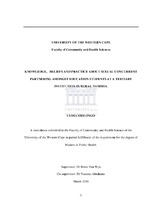Knowledge, beliefs and practice about sexual concurrent partnering amongst education students at a tertiary institution in rural Namibia
Abstract
Background: In an attempt to avert the HIV/AIDS epidemic, more research has been conducted to determine why the epidemic is more devastating in Southern African countries than anywhere else in the world. Heterosexual transmission is believed to be driving the epidemic in many sub-Saharan African countries. Recent research has indicated that having concurrent sexual partners is one of the factors contributing to the fast spread of HIV transmission in this region.Aim: This study aimed to describe the level of knowledge about the risk of HIV transmission posed by concurrent sexual partnering as well as beliefs and practices about concurrent partnering among education students at the Rundu College of Education(RCE) in the Kavango region of Namibia. Concurrent partnering was defined as a situation where a person has more than one sexual partner at the same time, during the
twelve months preceding the study.Methodology: There were 374 students registered for the 2009 academic year at RCE.All registered students were targeted for the study and 278 completed the questionnaire,yielding a response rate of 73.4%. The survey described prevalence of concurrent partnering, knowledge about risk posed by concurrent partnering as well as beliefs about concurrent partnering.Data collected was analyzed using Statistical Programs for Social Sciences (SPSS).Descriptive statistics were used to describe the prevalence of sexual concurrency,knowledge about risk posed by concurrent partnering and beliefs about concurrent partnering among the study population. Frequency of concurrency was cross tabulated with demographic variables like age group, sex and year of study as well as by knowledge and beliefs about sexual concurrent partnering.Results: The prevalence of concurrency in this sample was 9.4% with significantly higher prevalence (13.0%) among male students compared to females (5.3%). Males reported knowledge levels of 85.7% to 88.4% while females reported knowledge levels of 89.3% and 93.1%. More men (28.8%) than women (10.7%) agreed with the statement that sexual concurrency is a sign of manhood (p=0.00). Further, more male students(27.9%) compared to female students (6.1%) agreed with the statement that sexual concurrency is part of African culture and should continue (p=0.00).Conclusion: The study results show a high knowledge of risk posed by concurrency. It further reveals that a high number of people believe that concurrency is acceptable especially among men.HIV prevention activities promoting partner reduction and mutual fidelity should be implemented. Such activities should focus more on behavior change rather than on information giving. There is a need to create platforms for community members to debate
on cultural beliefs about sexual concurrency.

